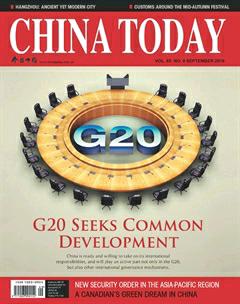Ready for the G20 Summit
“The G20 Summit will be held in Hangzhou, China, this September,” Chinese Premier Li Keqiang declared at the 11th AsiaEurope Meeting (ASEM) Summit in Ulaanbaatar on July 15, 2016. He extended invitations to all attendees, saying: “We are looking forward to working with all parties to improve global governance and facilitate world economic recovery.”
The world is undergoing complex changes, including profound economic adjustment and accelerated evolution of the international configuration and order. This brings great opportunities, but also poses major challenges to all countries. Promoting cooperation and development remains a daunting task. Therefore, Premier Li called for mutual respect and friendly consultation to explore new paths towards comprehensive and higher-level cooperation between Asia and Europe during the ASEM Summit. Li also put forward three proposals regarding Eurasia cooperation, namely, innovating the cooperative concept, adding momentum to the driving force, and consolidating the cultural foundation. G20 is a prominent mechanism in global governance, which is why China expects the Hangzhou Summit to play a greater role in improving global governance and reviving the world economy.
All economies should increase their sense of solidarity and collaboration, strengthen their shared responsibility, and carry out timely and in-depth dialogues. Only in this way can we effectively respond to global and regional challenges, prevent new sources of upheaval, and safeguard world peace and regional stability. All parties should strive to enhance the role and influence of multilateral mechanisms such as the ASEM and G20. To uphold the post-war international order we need to speak with one voice on major international issues, and make the international order and global governance system more fair and equitable. It is of particular importance that we abandon the cold war mentality and zero-sum game approach, and uphold fairness and justice in the world.
Furthermore, countries across the world should adhere to ideas of openness, diversity, and win-win results. Against the backdrop of economic globalization, we need to promote liberalization and facilitate trade and investment, oppose all forms of protectionism or trade war, and jointly safeguard justness and anti-discrimination in trade and investment. By proposing such an initiative on an internationally collaborative scale in the form of the “Belt and Road,” China focuses on the benefits for, and demands of, other countries while utilizing their own resources to their advantage. In so doing, China aims to break the bottleneck of regional development and enhance the capacity and level of overall development. China stands ready to work with other parties involved to foster a cooperation platform that is inclusive, balanced, and beneficial for all.
The G20 Summit in Hangzhou is themed “Toward an Innovative, Invigorated, Interconnected and Inclusive World Economy.”It is expected to reach valuable consensuses on and achieve good execution 0f issues such as innovating the growth pattern, improving global economic and financial governance, promoting international trade and investment, and accelerating inclusive and collaborative development. The aim is to inject vigor into the sluggish world economy.
China and relevant parties have made great efforts to ensure a good start to the summit. Last April, Chinese Vice Foreign Minister and G20 Sherpa Li Baodong spoke at the UN Headquarters in New York on the two historical “firsts” of the Hangzhou Summit. The first is that the development issue is the focus of the global macro policy architect. The second is that an action plan will be worked out to implement the UNs 2030 Agenda for Sustainable Development. In July of 2016, the G20 Trade Ministers Meeting endorsed the World Trade Outlook Indicator as the latest trade climate index, laid down the guiding principles for global investment, and issued a joint statement, the first of its kind in G20 history, approving a global trade growth strategy.
On July 22 Premier Li Keqiang held a roundtable dialogue in Beijing and met with visiting World Bank President Jim Yong Kim, IMF Managing Director Christine Lagarde, WTO DirectorGeneral Roberto Azevedo, Director-General of International Labor Organization Guy Ryder, Secretary-General of the Organization for Economic Cooperation and Development Angel Gurria, and Chair of G20s Financial Stability Board Mark Carney. They conducted in-depth discussions on a spectrum of topics from economic growth and structural reforms to trade, finance, development, and employment.
We have reason to believe that the G20 Summit in Hangzhou will be a new opportunity to improve global governance and pump up the world economy. Now, China is ready. Welcome to China, and work with us hand in hand.

